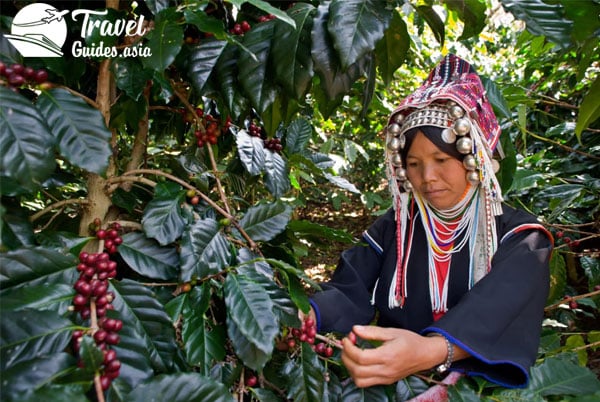Thailand’s Coffee Culture Explosion
Thailand has experienced a remarkable coffee culture boom in recent years, with its influence spreading throughout the country and becoming an integral part of Thai society. From trendy coffee cafes adorning the sidewalks of Bangkok and Chiang Mai to skilled baristas showcasing their craft in vibrant streets, the coffee scene has become deeply woven into the fabric of everyday life. Alongside these upscale coffee establishments, humble coffee carts can be found lining the city lanes, serving affordable iced-coffee with a distinctive local touch, strained through a traditional coffee-sock and sweetened with generous lashings of condensed milk. These coffee stands, haphazardly stationed outside train stations and in gritty alleyways, draw in crowds with their enticing aroma.

The Rise of Coffee Aficionados in Thailand
Beyond merely running successful coffeehouses, coffee aficionados in Thailand are driven by a desire to cultivate locally grown coffee. Baristas in the country are no longer content with brewing exceptional coffee; they are now seeking to understand and perfect every aspect of the coffee supply chain. This unfiltered enthusiasm has had a profound impact on Thai coffee culture, transforming the art of creating a picture-perfect, Instagrammable cup of Joe into a skillful craft.
Unveiling the History of Coffee Growing in Thailand
Thailand’s journey into coffee production traces back to the Chiang Mai Arabica market and the Thai Royal Project, initiated by King Bhumibol Adulyadej in 1969. This government-sponsored program aimed to alleviate poverty in Northern Thailand and establish a more sustainable economy. Previously notorious for its opium trade, the region saw families turning to coffee cultivation as a means of survival and improving their livelihoods. Encouraging locals to harness the potential of their fertile soil and ideal climate conditions, the project proved successful in transforming the area into a prominent coffee-growing region.

Chiang Mai: The Coffee Capital of Thailand
Chiang Mai, widely regarded as the coffee capital of Thailand, is home to the Royal Coffee Research Centre and Arabica Association of Thailand. This vibrant city serves as a hub for coffee enthusiasts and visitors alike. Exploring the region, you’ll encounter notable coffee brands and plantations that offer tours and sampling opportunities. Doi Chang, located high in the hills near Chiang Rai, provides breathtaking views of lush vegetation and hill-tribe dotted mountains. The Doi Chang Coffee House and Doi Chang Coffee Farm are destinations where visitors can indulge in a variety of coffees and purchase bags of beans. December is an ideal time to visit, offering cooler weather and a chance to witness the bustling processing plant in full swing. Doi Tung, another prominent Thai coffee brand, was established as a sustainable alternative to opium cultivation. The Doi Tung Royal Villa and Commemorative Hall, along with the plantation, offer an engaging and educational experience for visitors. DoiTung Lodge provides comfortable accommodation in a picturesque setting.
Journeying Through Coffee Growing Regions
Thailand boasts several distinct coffee growing regions, each with its own unique charm and offerings. Doi Chang and Doi Tung thrive in the north, Kanchanaburi captivates with its specialty coffee, and Chumphon enchants visitors with its expansive farming areas and stunning landscapes.

Kanchanaburi’s Hidden Coffee Gems
Thong Pha Phum, located in the northern part of Kanchanaburi, is a hidden gem renowned for its specialty coffee and captivating mountainous scenery. This unspoiled region offers a tranquil retreat and the chance to sample civet coffee, famously known as the world’s most expensive coffee. Accommodation options in Thong Pha Phum, such as Thong Pha Phum Place, offer simplicity, affordability, and a memorable stay.
Exploring Chumphon’s Coffee District
Situated in the southern part of Thailand, Chumphon stands as the region’s premier coffee district, boasting sprawling robusta coffee trees and expansive farming areas. As Chumphon gains popularity among tourists, it offers delectable coffee, captivating coffee plantation tours, and awe-inspiring views.
Notable Thai Coffee Brands
Doi Chang (Mountain Elephant) and Doi Tung (Mountain Flag) stand as Thailand’s most famous coffee brands, both approved by the EU Coffee Association for their quality and taste. The Doi Chang Coffee Company, born from a partnership between the Akha hillside tribe and Canadian coffee enthusiasts, dominates the Thai coffee scene. Doi Tung coffee, initially cultivated as a replacement crop for opium, has now expanded its presence with scattered coffee shops across the country. Notably, all proceeds from their handcrafted products go directly to the hillside tribes.
Lanna Café Coffee, created by an NGO supporting community development of hilltribe farmers in the Lanna Region, offers Fair Trade Certified Arabica coffee, perfect for those seeking to make a positive impact while enjoying a world-class cup of joe. For those seeking an unconventional experience, Black Ivory Coffee, produced in Northern Thailand, stands out as coffee beans are consumed by elephants and collected from their dung. However, this unique coffee comes with a hefty price tag, costing over USD 1,000 per kilogram.

Savoring Traditional Thai Coffee
Traditional Thai coffee is typically found at markets or food stands scattered throughout the country. Prepared by filtering ground coffee beans through a cloth or “sock,” the resulting brew is black and poured into a carafe. The coffee is steeped for approximately ten minutes, yielding a dark, robust, and slightly bitter flavor. Thai coffee often exhibits a bitter profile due to the coffee beans used and the tendency for over-extraction, possibly influenced by the desire to stretch the grounds and save money. To counterbalance this bitterness, locals indulge in the addition of sweetened condensed milk, evaporated milk, and brown sugar. Traditional Thai iced-coffee, known as Oliang, features various recipes incorporating ingredients such as sesame seeds, cardamom seeds, soybeans, corn, and rice. Tourists and locals alike savor this sweet, caffeinated delight on hot and humid days.
Thriving Coffee Chains in Thailand
While coffee can be found on nearly every street corner in Thailand, the country also boasts thriving coffee houses and chains. Black Canyon, Amazon, Coffee World, and Doi Chaang are among the most popular coffee chains in Thailand, catering to a variety of tastes and preferences. Whether you crave a sugary concoction or a traditional black brew, Thailand’s coffee culture ensures a satisfying experience for every coffee lover.
Embrace the Diversity of Thai Coffee Culture
From its rich history of coffee cultivation to the burgeoning coffee-growing regions and the array of renowned coffee brands, Thailand offers a captivating and diverse coffee culture. Whether you embark on a coffee plantation tour, sip on traditional Thai iced-coffee, or explore the thriving coffee chains, the vibrant world of coffee in Thailand is sure to delight and satisfy your caffeine cravings.
